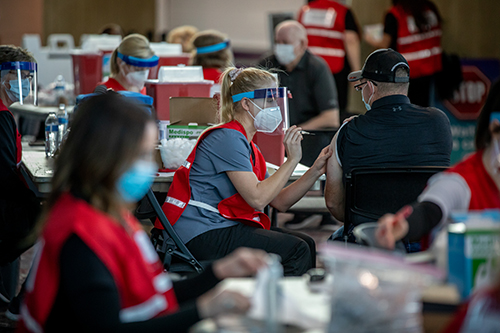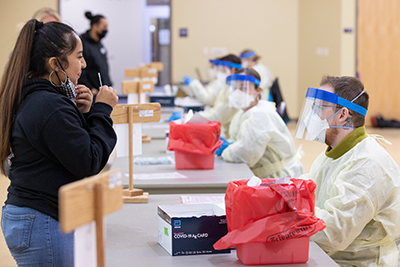Weber State to Hold Vaccination Clinic for Campus Community with Help of Volunteers
Weber State University will host a COVID-19 vaccination clinic at the Dee Events Center for all faculty and staff on April 8 from 10 a.m. to 2:45 p.m. Those who participate will be invited back to get their second dose of Pfizer on April 29.
“We are fortunate to have this dedicated time for Weber State faculty and staff to receive their vaccinations,” said WSU President Brad Mortensen. “Having a vaccinated faculty and staff enhances opportunities for in-person classes, on-campus events and other  educational activities in any mode that best serves our students and community.”
educational activities in any mode that best serves our students and community.”
Thanks to the efforts of a volunteer army, Weber State has provided vaccinations and testing for thousands of members of the campus community. Since the Dee Events Center clinic opened on Jan. 5, approximately 50,000 doses have been administered.
Vaccinations and testing have involved a monumental labor of hundreds of dedicated individuals as well as a close collaboration between Weber State and the Weber-Morgan Health Department.
“Weber State has been proactive in our community throughout the pandemic,” said Brian Cowan, Weber-Morgan Health Department executive director. “They acted to ensure their students and faculty have the tools and knowledge to protect themselves from COVID-19, and because they were so prepared, they graciously stepped forward to offer the Dee Events Center to be the mass vaccination site. Our entire community owes them a debt of gratitude.”
More than 200 faculty, staff, and students from the Weber State Dumke College of Health Professions are part of the WSU vaccination team and are trained, screened, credential-certified and enrolled with the Weber-Morgan Medical Reserve Corps. The group has provided 50% or more of the staffing for the Dispensing Unit or vaccination area of the clinic at the Dee. Another 128 nursing students, overseen by nursing faculty, have helped with vaccinations.
Weber State also provides a minimum of 30 non-medical employee volunteers at the clinic from many departments across campus, including police, fire, facilities management, Dee Events Center staff, Human Resources, Marketing & Communications, and Environmental Health & Safety. From freezers that store vaccines at precise sub-zero temperatures, to social distancing protocols to staffing, everything had to meet exact guidelines and required coordination and supervision.
"Our relationships with both the state and our local health departments have been amazing, especially our partnership with the Weber-Morgan Health department,” said Dane LeBlanc, WSU Public Safety director.
LeBlanc, who has led WSU’s emergency planning for many years, notes that emergency preparedness is a field that allows very little margin for error; proactive may be the ideal, but reactive is often the reality. The line between a controlled disaster and one dangerously out of control often depends on accurate and practical training and exercise.
.jpg) Weber State’s first pandemic response was back in 2009 with an H1N1 vaccination clinic at the Dee. The continued planning and training efforts allowed the university to respond quickly and efficiently to COVID. University leadership was ready to stand up a task force quickly, close campus, develop re-opening protocols and establish a very large and viable testing program.
Weber State’s first pandemic response was back in 2009 with an H1N1 vaccination clinic at the Dee. The continued planning and training efforts allowed the university to respond quickly and efficiently to COVID. University leadership was ready to stand up a task force quickly, close campus, develop re-opening protocols and establish a very large and viable testing program.
“Most amazing in all of this is the effort of campus community members who displayed a level of volunteerism that was remarkable,” LeBlanc said. “I have never been more proud of our university and the faculty and staff who work at Weber State. Our successful testing efforts could not have been possible without our volunteers.”
In addition to the vaccination clinic, Weber State volunteers helped keep the campus safer with robust testing clinics at both the Ogden and WSU Davis campus in Layton for symptomatic and asymptomatic individuals.
Volunteers from WSU’s Medical Laboratory Sciences (MLS) program, the Annie Taylor Dee School of Nursing, and even many outside of the health professions programs administered more than 16,000 COVID-19 tests.
With over 450 volunteers from all across campus and different departments, Matthew Nicholaou, medical laboratory sciences chair, said the testing process operated like a well-oiled machine.
Setting up the COVID-19 testing process even before broad testing was plausible, Nicholaou and Sally Cantwell, School of Nursing chair, devised a system for testing symptomatic students, faculty, and staff in a mock clinic. The School of Nursing provided full-time faculty to help with check in, administering the tests, recording the results and keeping the site clean. MLS staff assisted in verifying results and maintaining supplies.
Once fall semester approached, Utah gained access to the rapid tests, and Weber State joined the statewide effort to discuss the possibilities and costs of testing on campus. In late November 2020, then-Lt. Gov. Spencer Cox announced that universities across the state would need to conduct asymptomatic testing weekly for students and employees who were on campus.
Having the state help with the costs of the tests made the large scale, asymptomatic testing more feasible, Nicholaou said. But it brought a new challenge.
“We depended on volunteers, and all of a sudden when you have to test 1,000 people five times a week, we needed a massive team,” Nicholaou said. “We put the word out, and it was really cool to see faculty, students and staff from all over campus step up with testing.”
Joshua Tay, a medical laboratory science major, has been around for a majority of the process. As a MLS student, he was not only interested but also qualified to conduct testing.
“I thought this was one way that I could do something to help with a problem that everyone was going through,” Tay said.
Tay estimated he volunteered more than 80 hours since the beginning of COVID testing on campus.
 “I cannot express how much joy it has brought me, and continues to bring me, to see the collaboration come together among faculty, staff and students across the WSU campus.” Cantwell said. “Although this has taken many, many volunteer hours, everyone arrives with smiles on their faces because they are helping keep our campus safe and working toward a common goal. I will never forget this experience. I have made friends for life.”
“I cannot express how much joy it has brought me, and continues to bring me, to see the collaboration come together among faculty, staff and students across the WSU campus.” Cantwell said. “Although this has taken many, many volunteer hours, everyone arrives with smiles on their faces because they are helping keep our campus safe and working toward a common goal. I will never forget this experience. I have made friends for life.”
Many WSU students, specifically those in the healthcare professions, volunteered their time. Those who needed clinical hours were the ones that Nicholaou and his team contacted first. But others on campus such as faculty, administration and staff made time to help with testing.
History professor Kathryn MacKay said she chose to volunteer because she spends a great deal of time on campus and lives close by.
“I found it a satisfying experience,” MacKay said. “I felt I was being useful,”
Moyes College of Education Dean Kristin Hadley began volunteering in January. “Many people on campus sacrificed time in order to help the whole WSU community,” she said.
As vaccinating has ramped up, testing has contracted, but all the volunteers are proud of their work, which allowed the university to continue its educational mission successfully. A visible measure of the success is reflected in the record number of Wildcats (more than 6,000) who have applied for the 2020-21 graduation.
Jessica Oyler, Human Resources assistant vice president, has helped coordinate much of the volunteer effort. The outcome is rewarding for those volunteers and administrators who have made a significant contribution to the safety of the community during a pandemic.
“Our university has always impressed me with how we come together for the good of our community to make things happen,” Oyler said. “But this last year has been just incredible as our students, faculty and staff have stepped up again and again to keep our campus community safe, while also fostering a welcoming and truly caring environment. I am so proud to be a part of such an awesome group of people.”
For photos, visit the following links:
https://wsuucomm.smugmug.com/Marketing-Communications/Covid-19-Response/COVID-19-Vaccine
https://wsuucomm.smugmug.com/Marketing-Communications/Covid-19-Response/COVID-19-Testing
Visit weber.edu/wsutoday for more news about Weber State University.
Marisa Nelson, Dumke College of Health Professions marketing assistant
marisanelson@weber.edu- Contact:
Allison Barlow Hess, Public Relations director
801-626-7948 • ahess@weber.edu